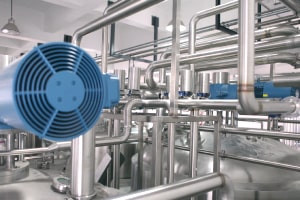‘Oil in Refrigeration and AC Systems’ is a free online course that begins by introducing you to the safety devices on refrigeration plants and compressors, the single-stage vapour-compression refrigeration cycle, as well as fluorocarbon refrigerants based on methane and ethane. The types of leak tests (such as using soap, fluorescent dye and nitrogen) as well as electronic leak detectors (like ultrasonic, heated diode, heated electrolyte, infrared and corona discharge) are also vital to your knowledge. This course will teach you about leakage rectification systems and the recovery of refrigerant gas, as well as three basic methods of recovery (liquid, vapour and push-pull). Cautions when charging gas in a reefer and refrigerant system as well as the procedure for charging ship’s manual will also be covered in this course. You will learn about the HVAC (heating, ventilation and air conditioning) unit, details of HVAC gauges, types of manifold gauges (which include R410A, R22, and R134a) as well as how to connect HVAC gauges to refrigeration. The difference between ozone depletion potential (ODP) and global warming potential (GWP), as well as alternative, secondary, and future refrigerants, will also be explained.
Do you know how air and oil are handled in a refrigeration and air conditioning system, how to safely isolate the system, as well as how to purge air from it? You will also learn about the management of oil return; the functions, working principles, and components of a single compressor system; and all about multi-compressor systems. The process of oil return in the suction collector and to the crankcases, centralized oil return as well as the efficiency of the oil separator using one separator per compressor will also be covered in this course. You will master high-pressure oil return, as well as the proper processes required when adding oil to the system. You will also learn about the steps involved in cleaning the oil strainer, as well as the key functions of oil in a refrigeration system and the classification of lubricating substances like natural mineral oil, synthetic oil and half-synthetic oil. The detrimental effects of oil in a system, once it gets past the compressor, as well as how oil contamination in the refrigerating system reduces its overall efficiency, will also be covered by the material.
Furthermore, this course will help you get familiar with preventive treatment and methods to avoid the introduction of moisture into the system. The harmful effects of oil in a system, which include mechanical breakdown, modification of thermodynamic properties of the refrigerant, as well as decrease in the efficiency of exchangers, will also be covered. Learn how to test compressor suction as well as the functioning of discharge valves. Study the definition of and reasons for defrosting, as well as defrosting systems like water wash, hot gas, electric, manual shutdown and warm brine defrosting. The various methods to defrost brine systems, cargo fridge defrosting, as well as methods of defrosting will also be demonstrated to you.
What You Will Learn In This Free Course
View All Learning Outcomes View Less All Alison courses are free to enrol, study, and complete. To successfully complete this Certificate course and become an Alison Graduate, you need to achieve 80% or higher in each course assessment.
Once you have completed this Certificate course, you have the option to acquire an official Certificate, which is a great way to share your achievement with the world.
Your Alison certificate is:
- Ideal for sharing with potential employers.
- Great for your CV, professional social media profiles, and job applications.
- An indication of your commitment to continuously learn, upskill, and achieve high results.
- An incentive for you to continue empowering yourself through lifelong learning.
Alison offers 2 types of Certificate for completed Certificate courses:
- Digital Certificate: a downloadable Certificate in PDF format immediately available to you when you complete your purchase.
- Physical Certificate: a physical version of your officially branded and security-marked Certificate
All Certificate are available to purchase through the Alison Shop. For more information on purchasing Alison Certificate, please visit our FAQs. If you decide not to purchase your Alison Certificate, you can still demonstrate your achievement by sharing your Learner Record or Learner Achievement Verification, both of which are accessible from your Account Settings.
















 Avg. Hours
Avg. Hours  Contains Video
Contains Video  CPD Accredited
CPD Accredited 
 Total XP:
Total XP: 
 Knowledge & Skills You Will Learn
Knowledge & Skills You Will Learn 


